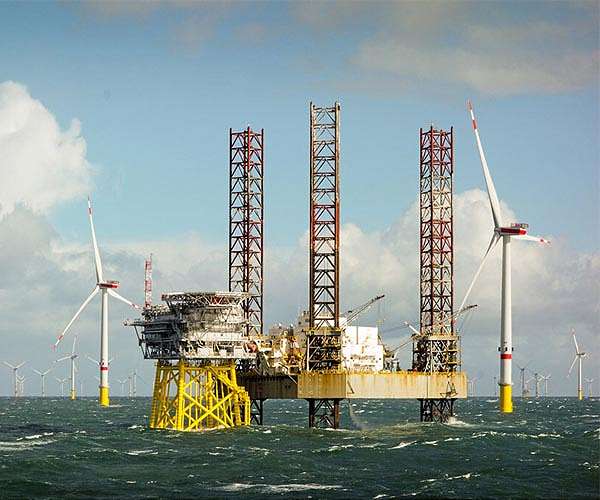Harish Krishnamoorthy, assistant professor of electrical and computer engineering at the University of Houston, has been selected by the Gulf Research Program (GRP) of the National Academies of Sciences, Engineering and Medicine as an early-career research fellow in the Offshore Energy Safety track. He and four other fellows will “contribute to the understanding, management and reduction of systemic risk in offshore energy activities.”
He is the first UH professor to win this GRP early-career research fellowship. “I am happy and honored to be the first one, but hopefully there will be a lot more in the coming years,” Krishnamoorthy said.
With expertise in power electronics, power converters and offshore technologies, Krishnamoorthy was recognized as an “OTC Emerging Leader” at the 2022 Offshore Technology Conference for “contributions to promoting workforce development in offshore with a strong focus on enhancing the safety and reliability of the electrical power systems and equipment, as well as reducing the carbon emissions.”
His research interests include high-density power conversion for grid interface of energy systems, machine learning-based methods for improvement in quality and reliability of power electronics, advanced electronics and control for mission-critical applications.
Krishnamoorthy, who is also associate director of the Power Electronics, Microgrids and Subsea Electric Systems Center (PEMSEC) at UH, believes the Gulf of Mexico offers various challenges and opportunities.
He estimates there are about 1,500 oil and gas rigs located offshore across the globe, with the largest share in the North Sea and the Gulf of Mexico. The current electric distribution system of oil and gas platforms is characterized as a weak electric grid in need of much improvement.
In addition, even though there are no large-scale offshore wind farms currently installed in the Gulf of Mexico, the recent initiatives by the federal government have raised interest in the idea. Several oil and gas companies, such as Shell, Chevron and Exxon, see this as an opportunity to cut their carbon emissions and are actively looking to contribute to the integration of offshore wind energy systems with subsea energy production activities. Moreover, the potential development of hydrogen as an “energy carrier” of the future has added a new dimension to offshore energy production and transportation activities.
All of these future possibilities come with increased safety challenges. “When there are so many electronics involved, safety and reliability are going to be very critical,” Krishnamoorthy said. “I have been looking at safety aspects a lot in my research as well as how to connect subsea oil and gas systems with offshore renewable systems.”
He recalled the Deepwater Horizon incident in 2010. “If the equipment were functioning properly, probably 11 people wouldn’t have lost their lives,” he said. “I am working on power converters and circuit breakers as well as intelligent monitoring and control systems that will help improve safety and reliability in the field.”
The early-career award is not attached to a specific project, which allows fellows to take on bold research they might not otherwise be able to pursue. Each of them will receive a $76,000 award, mentoring support and a built-in network of current and past cohorts. Krishnamoorthy is looking forward to using the funds to further his research work; work with mentor Ramanan Krishnamoorti, professor of petroleum engineering and vice president of energy and innovation at UH; and connect with a community of like-minded fellows.
“The opportunity to collaborate, learn and grow this award offers are truly exciting,” Krishnamoorthy said.
The National Academies’ Gulf Research Program is an independent, science-based program founded in 2013 as part of legal settlements with the companies involved in the 2010 Deepwater Horizon disaster. Its goal is to enhance offshore energy system safety and protect human health and the environment by catalyzing advances in science, practice and capacity, generating long-term benefits for the Gulf of Mexico region and the nation.
“These exceptional individuals are working hard to pursue new research, technical capabilities, and approaches that address some of the greatest challenges facing the Gulf and Alaska regions today,” said Karena Mary Mothershed, senior program manager for the Gulf Research Program’s Board on Gulf Education and Engagement. “We are incredibly excited to announce these new Early-Career Research Fellows, and to continue supporting them as they make lasting impacts.”
Research Opportunity: Gulf Research Program Announces Early-Career Research Fellows in Offshore Energy Safety and Education Research
Related Links
University of Houston
Wind Energy News at Wind Daily
|
We need your help. The SpaceDaily news network continues to grow but revenues have never been harder to maintain. With the rise of Ad Blockers, and Facebook – our traditional revenue sources via quality network advertising continues to decline. And unlike so many other news sites, we don’t have a paywall – with those annoying usernames and passwords. Our news coverage takes time and effort to publish 365 days a year. If you find our news sites informative and useful then please consider becoming a regular supporter or for now make a one off contribution. |
||
|
SpaceDaily Contributor $5 Billed Once credit card or paypal |
SpaceDaily Monthly Supporter $5 Billed Monthly paypal only |
|

![]()
A healthy wind
Boston MA (SPX) Dec 05, 2022
Nearly 10 percent of today’s electricity in the United States comes from wind power. The renewable energy source benefits climate, air quality, and public health by displacing emissions of greenhouse gases and air pollutants that would otherwise be produced by fossil-fuel-based power plants.
A new MIT study finds that the health benefits associated with wind power could more than quadruple if operators prioritized turning down output from the most polluting fossil-fuel-based power plants when ener … read more

